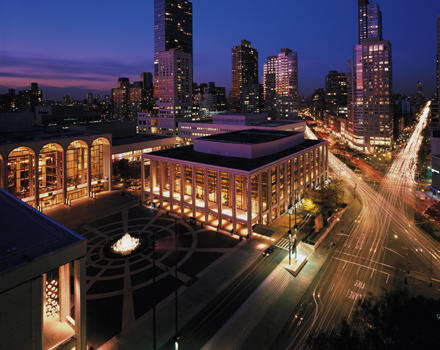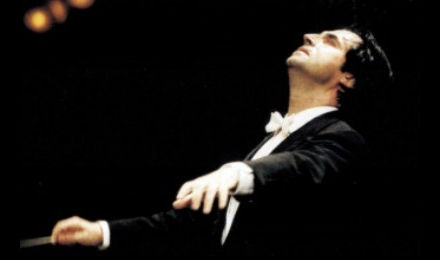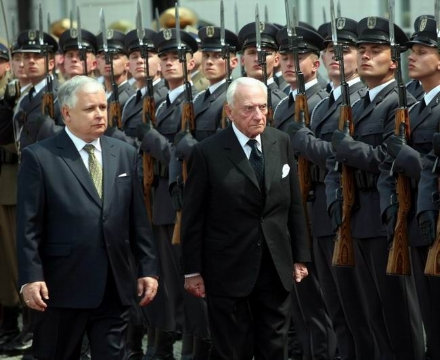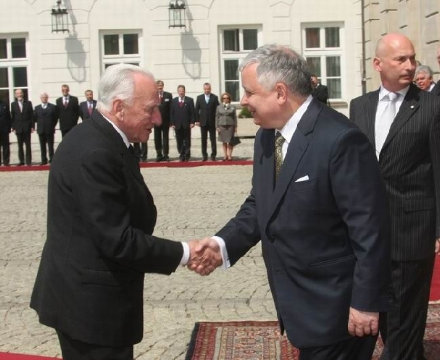2007 June
About Andrew Cusack
 Writer, web designer, etc.; born in New York; educated in Argentina, Scotland, and South Africa; now based in London.
Writer, web designer, etc.; born in New York; educated in Argentina, Scotland, and South Africa; now based in London. read more
News
Blogs
Reviews & Periodicals
Arts & Design
World
France
Mitteleuropa
Knickerbockers
Argentina
The Levant
Africa
Cape of Good Hope
Netherlands
Scandinavia
Québec
India
Muscovy
Germany
Academica
Wedding Bells

I’m off to California for a few days (I’ve never been before) for the wedding of two friends with whom some of the readers of this blog may be acquainted, Abigail Hesser & Jonathan Burke. It should prove quite good fun, and of course we certainly had a ball at the the last wedding. And it’ll be in the old rite as well!
‘First of Britain’s Sons To Die’
Saint Alban, June 22

Sing triumphant o’er the foe;
Tell of him, a Martyr glorious,
For the changeless truth laid low;
Faithful servant, bright example,
Whom all lands and ages know.
Valiant soldier, noble Martyr,
First of Britain’s sons to die,
Pagan ire and cries withstanding,
By the grace of God Most High,
By the strength of Him, Protector
Who, in strength and power, was nigh.
Laud and honour to the Father,
Equal honour to the Son,
Adoration to the Spirit,
Ever Three and ever One,
Consubstantial, Co-eternal,
While unending ages run.
These were the words to the school hymn at St. Alban’s College down in Argentina, which I briefly had the privilege of attending and which is currently celebrating its centenary year (more on that in another post). It was down beneath the Southern Cross that I first became more closely acquainted with good Saint Alban, who was the first Christian martyr of Britain.
‘We’ve Lost More Than We’ll Ever Know’
In Three Corners of the Commonwealth, Popular Musicians Demonstrate Rejection of Modernity

In South Africa, England, and Quebec, popular musicians have expressed regret over the rejection of their traditional cultures by the destructive onward march of modernity. The hugely popular song ‘De La Rey’, sung in Afrikaans by Bok van Blerk I have already explored in greater depth in an article for Norumbega, but ‘Roots’ by England’s Show of Hands and ‘Dégénération’ by Québécois group Mes Aïeux are worthy of notice.
‘Roots’, as one would expect from the title, decries the severing of the English people from their lyrical musical tradition and lifestyle, being replaced by “Indian, Asian, Afro-Celt”, while the song’s refrain evokes images of a people adrift: “Haul away boys let them go/ Out in the wind and the rain and snow/ We’ve lost more than we’ll ever know/ On the rocky shores of England”. In one verse, the song taps into a particular pet peeve of mine, the complete invasion of pubs by the dreaded television screen:
Is three folk singers in a pub near Wells
Well I’ve got a vision of urban sprawl
Pubs where no one ever sings at all
And everyone is staring at a TV screen
Overpaid soccer stars, prancing teens
Australian soap, American rap
Estuary English, Baseball cap
There is no greater killer of good conversation than the massive influx of television screens into the pubs. Just the other evening I was down in our regular in Bronxville and from my vantage point alone I could see three television screens. The bright technicolor projection of baseball, soccer, football, and rugby into an otherwise dark space is too great a distraction for the eye. Bad enough sitting in a booth, it is even worse having dinner at the bar when you do not at least have the advantage of sitting opposite your drinking companion. How much more of a good time it would be without those dazzling displays, and without the obnoxiously loud music, either piped in from the jukebox or else some third-rate band singing third-rate cover songs of third-rate rock groups. Bleccch! It is those moments when one yearns to be ensconced by the fire in the Russell on the Scores in St Andrews, either accompanied solely by a book and a solid pint, or engaged in the usual joviality with the after-Rosary crowd.
The Québécois song, meanwhile, laments the decline of the family from large in size and from tied to the earth to solitary and confined in the city. The name of the band — Mes Aïeux — means “My Ancestors” and ‘Dégénération’ is a play on words, meaning ‘degeneration’ but also soundling like ‘des generations’ — ‘of the generations’. The song opens:
Ton arrière-grand-père, il a labouré la terre
Et pi ton grand-père a rentabilisé la terre
pis ton père, il l’a vendu pour devenir fonctionnaire
Et pi toé mon p’tit gars, tu sais pu c’que tu vas faire
Dans ton p’tit trois et d’mi ben trop cher, frète en hiver
Il te vient des envies de dev’nir propriétaire
Et tu rêves la nuit d’avoir ton petit lopin d’terre
Your great-great grandfather cleared the earth
Your great-grandfather laboured on the earth
Your grandfather turned a profit from the earth
Then your father sold the earth to become a bureaucrat
Now you, my little man, you don’t know what to do
In your little 3 room apartment – too expensive and cold in the winter
You want something to call your own
And you dream at night of having your own little piece of earth.
The next verse goes on about the maternal line of the family: the great-great grandmother “had fourteen kids”, the next generation “had about as many”, the next “had three, that was enough for her” but “Your mom didn’t want any, you were an accident”.
Quand tu fais des conn’ries, tu t’en sauves en avortant
Mais y’a des matins, tu te réveilles en pleurant
Quand tu rêves la nuit d’une grande table entourées d’enfants
Now you, my little lady, change partners all the time
When you make a mistake you escape by aborting
But there are mornings you awake crying
When you dream in the night of a large table surrounded by little ones.
The song is one of the most popular downloads on iTunes Canada, and the band’s most recent album has gone double-platinum.
Music videos of ‘De La Rey’, ‘Roots’, and ‘Dégénération’ after the jump.
Sources Fides et Ardor: Sign of Hope – Mes Aïeux | Fides et Ardor: The People Speak (or sing…)
Previously: Breaking the Mold in Quebec | The Men Who Saved Quebec | Hitchcock in Quebec
Diary

EARLY YESTERDAY EVENING I found myself on the West Side and with a bit of free time, so I sauntered down Broadway to Columbus Circle to finally investigate in the flesh this great public place after its complete rehabilitation some two years ago. I am happy to report that the Circle’s refurbishment is quite a successful one. My only reservations were minor details, but as these were all done in an extremely simple and smooth modern style, they are much less objectional, and perhaps serve to focus attention on the sculptor Gaetano Russo’s splendid monumental column from which Cristóbal Colón, Admiral of the Ocean Sea, Viceroy and Governor of the New World presides over the grand plaza consecrated to his memory.
Colón’s name is rendered on the monument as ‘Cristoforo Colombo’, which seems appropriate since the monument was paid for by public subscription raised by Italian-Americans, and it is commonly assumed that Columbus was Italian. He may have been Genoese, Catalan, Portuguese, or Corsican, but he described himself as being from lands under the rule of Genoa, which lends significant credence to the Genoese and Corsican theories. In Spain, however, he is apparently Spanish, or so one daughter of Iberia, the wife of a frequent reader of this little corner of the web, informs us. The happy couple were strolling through Columbus Circle recently and the good lady was shocked to discover the purported Italian origin of the man who brought Christianity to the New World. After all, Spain’s national day — the Día de la Hispanidad — is October 12, the day in 1492 that Columbus first set foot in the New World. (In woebegone Venezuela, the vulgar socialist dictator has proclaimed October 12 as the Día de la Resistencia Indígena, or Day of Indigenous Resistance, and the Columbus Column in their capital city of Caracas was toppled on that day in 2004).
Anyhow, not only was the good lady was shocked at our monument’s proclamation of the Discoverer’s Italian-ness but the combination of that with the presence in Columbus Circle of the beautiful U.S.S. Maine Monument led the observer to conclude that the public plaza should be instead be named “Anti-Spain Square”. It was the disastrous sinking of the Maine, after all, which led to the Spanish-American War, the result of which was America’s most unfortunate and regretful act of taking Spain’s empire off her hands. (Contrary to Mr. Kipling’s idealistic urging of America to take up the imperial mantle in his poem ‘White Man’s Burden’, this turned out to be a fairly good deal for the Spaniards, and a very poor deal for the peoples of the United States).

Politics aside, I enjoyed the few minutes during which I ruminated in the square (or circle, if ye be pedants). I recall many years ago the debate surrounding how to improve Columbus Circle that there was a near-universal desire for there to be more trees but that the very shallow depth between the street surface and the subway below presented difficulties in this regard. The redesigners have solved this problem by encircling the center of the circle with a raised ridge, on which are planted a number of trees which, we trust, will be even more appreciated as they mature. The raised ridge, which features jets of flowing water around the inner circle, also serves to innoculate the center from the noise of the traffic which, the Circle being situated at the confluence of Broadway, Central Park West, Central Park South, and Eigth Avenue, is considerable.
And so, I judge the new Columbus Circle a success, and I am happy to the report that the American Society of Landscape Architects concur, having awarded it their General Design Award of Honor. Another random fact which surprisingly few people know is that Columbus Circle is the spot from which distances to New York are numerated, akin to Moscow’s Red Square and London’s Trafalgar Square (if I recall correctly).
LEAVING COLUMBUS CIRCLE, I sauntered back up Broadway to another of Manhattan’s engaging places, Lincoln Center. Critics accused the architects of the performing arts complex of cribbing off of Rome’s E.U.R., but one wishes the three halls facing Lincoln Center’s plaza had the same crispness of those modern Roman structures. The thirty years between the E.U.R. of 1930s Italy and the Lincoln Center of 1960s New York were years in which the quality of modernism declined just as greatly as its supremacy increased. Despite this, the plaza of Lincoln Center is one of the most successful public places in Manhattan. I have often lamented the absence from New York of the open piazza so common on the Continent. This plaza competes with Central Park’s Bethesda Terrace as the best example of the type in Manhattan.

The plaza is raised above the neighboring Lincoln Square (one of the many triangular squares created by Broadway’s healthy disregard for the grid) and is reached by a gentle rise of stairs. Viewed from the square it appropriately seems like a stage upon which all our great dramas are played. The dance of the New York City Ballet in the State Theatre on the left, the music of the New York Philharmonic in Avery Fisher Hall on the left, and in the center, the Metropolitan Opera in the Metropolitan Opera House; the greatest opera company in the Americas, not to mention one of the best in the entire world. And from the hour of seven or so on the evening of performances, the three arts mix and mingle in the plaza as attendées wait to meet their companions and enter whichever of the respective halls they are to spend the evening. Some jealously preserve a seat of honor on the rim of the central fountain, while others hide from the elements (the beating sun, the heaving rain) in the shelter of the arcades, while still more meander slowly to and fro around this piazza dell’arte.
It’s unfortunate, then, that the elders of Lincoln Center insist on erecting temporary stage structures in the middle of the plaza, partially obstructing the fountain, during the warmer months when, above all other times, it should be open for all to enjoy. The creators of Lincoln Center conceived of the obvious desire for outdoor performances during the summer, and so they built the bandshell in Damrosch Park in between the Opera House and Avery Fisher Hall, just diagonally adjacent to the plaza. Surely the plaza is meant to be an open space where all the events can mix, blend, interact, influence, before finally separating into their appropriate places. If there are to be outdoor performances, hold them where they were meant to be, and if that place suffers from some malfunction of design, then redesign that place rather than rudely interjecting a particular event into what was meant to be the public square for all.
THIS PARTICULAR EVENING it was into Avery Fisher Hall for a performance of the New York Philharmonic, now in its 165th year. The program was Rossini’s overture to Semiramide and Schubert’s Symphony No. 3 in D major (D.500), with Dvořák’s Symphony No. 5 in F major (Op. 76). Riccardo Muti wielded the conductor’s baton and the result was definitely less than was expected. I had only heard Muti’s conducting on the radio in passing and, while admittedly not devoting much thought to it, he seemed a fairly capable conductor. In person, however, he left much to be desired. Rossini’s overture was merely lackluster but Schubert’s symphony was actually surprisingly poor. Perhaps the worst thing was observing Muti in action, for the man looked like an utter fool. His conducting seemed unnatural, choreographed, even foppish. And those ridiculous jestures towards the first violins! I wanted to slap the man, and I shouldn’t be surprised if the violins wanted to themselves. Towards the middle of the Schubert symphony, I began to think of the man as a proper ass, the tails of his evening jacket acting the part of hind legs. My only solution to the St. Vitus’s dance on the conductor’s dais was to shut my eyes and imagine that I was there in the Austrian capital in that autumn of 1815, after the chancellors and ministers of the crowned heads of Europe had departed the Congress of Vienna when peace and order were plotted, in the home of Otto Hatwig where (scholars posit) the work was premiered.

The friend I accompanied that evening actually knows about the inner workings of music (I am actually an ignoramus on the subject, and simply like what sounds good to me) and agreed completely with me on the subject during the intermission. Luckily, the Dvořák fared better, but one had the niggling suspicion that this was the Philharmonic working its magic in spite of Mr. Muti, rather than at the command of his baton. My knowledge and appreciation of Dvořák has slowly grown, from that first passing fondness we all have for his Symphony No. 9 “From the New World”. My appreciation for the Philharmonic grows, when I see they have printed in the program that Mr. Dvořák was born in Mühlhausen, Bohemia, rather than the more modish style of “Nelahozeves, Czech Republic” that would find favor elsewhere.
Perhaps I am too hard on Mr. Muti. Perhaps he and the Philharmonic were simply not a good fit for eachother. At any rate, I shouldn’t complain as one doesn’t often get box seats to a sold-out performance with every seat in the hall occupied (though, to be honest, the sound is better down in the orchestra seats). But how I wish I could have seen von Karajan while he was alive!
After the baton had finally fallen for the night, my friend and I had the same stroke of genius at exactly the same moment and decided to head up to good old Café Lalo, but unfortunately everyone else had the same idea (Saturday night? Lalo’s? What did we expect?) so we comforted ourselves with a pint or two at the Parlour instead.
Ron Paul on the Box
Above, the scene outside as Ron Paul heads in to Stephen Colbert’s faux news show and below, the interview itself.
On the Daily Show:
Interestingly, Ron Paul remains on top for Technorati tags, tracking what people are talking about on blogs, even beating Paris Hilton at the height of her media kerfuffle.
Peter Simple V
A wise old man once said ‘good fences make good neighbours’ but history is chock full of territorial disputes nonetheless. Woefully, ancient land claims and cross-border irridentism reared their ugly head on the pages of the Daily Telegraph as well. These two columns, the fifth installment in our series introducing you to the greatest newspaper columnist who ever lived and breathed, retells just such a territorial dispute which erupted over changes in the layout and denomination of the newspaper page on which the Peter Simple column perenially (since the dawn of time, beyond the age of our forefathers) appeared.
A Small Crisis
 For some time now, the eastern part of the region in which my column occasionally appears has been headed “End Column” no matter what appears on it, whether literary criticism, humour or chess (which has taken permanent occupation of the southern part of the territory). Then one morning the world woke to a startling innovation: the territory was simply headed “Chess”. What had happened? Had an extremist group of chess writers suddenly claimed sovereignty over the whole region? It was the more surprising in that of all the paginal powers, Chess, devoted as it is to pure intellect, has historically always been the least aggressive, well satisfied with the ample territory it occupies and threatening no other power.
For some time now, the eastern part of the region in which my column occasionally appears has been headed “End Column” no matter what appears on it, whether literary criticism, humour or chess (which has taken permanent occupation of the southern part of the territory). Then one morning the world woke to a startling innovation: the territory was simply headed “Chess”. What had happened? Had an extremist group of chess writers suddenly claimed sovereignty over the whole region? It was the more surprising in that of all the paginal powers, Chess, devoted as it is to pure intellect, has historically always been the least aggressive, well satisfied with the ample territory it occupies and threatening no other power.
A serious diplomatic incident followed. Our own columnar government was not slow in sending a strong protest to the chess authorities. Partial mobilisation was ordered. A squadron of Blériot Mark II reconnaissance aircraft was sent to patrol the whole area. A gunboat of the Don Carlos class was despatched to the Interpaginal Sea.
Fortunately, the traditional panic and flight of the peasantry was quelled in time. Soon, wiser counsels prevailed and the crisis evaporated as rapidly as it had arisen. But it cannot be too strongly emphasised that in the event of a serious threat to the paginal balance of power, the column could not and would not stand idly by. For although this column is not always corporeally present in the eastern territory it is always present in a metaphorical and mystical sense, in all the territories where it has ever been.
Signs and Wonders
AS veteran readers of this column will recall (“Are there any others?” our boring expert “Narcolept” never fails to ask), a diplomatic impasse was caused last month when the chess flag was raised over the territory formerly known as “End Column”, implying an exclusive claim to suzerainty over a territory shared by other powers including ourselves.
The situation was supposed to have been normalised when, as is so often the case, wiser counsels prevailed. Sadly, this is not so. Extremist elements in the column, who have long been impatient with its conciliatory policy, are thought to be planning direct action by launching a surprise attack on the heartland of chess itself, the southern region in which its authority has never been disputed, and setting up a puppet state with only nominal allegiance, perhaps, to the parent column.
Are these hotheads and firebrands harking back to the so-called “time of troubles” in the 1970s, the time of “Peter Simple II” and the labyrinthine intrigues that led to a coup by General Waugh and the present “binary” dispensation? As a timely pronunciamiento from the Ministry of Columnar Guidance warns, “Such irresponsible day-dreaming could have the gravest possible consequences,” even leading to the onset of the long dreaded Fimbul Winter and the end of the column itself.
To make matters worse, certain elements seem bent on defying the basic columnar Law of Non-Interaction, which prevents different aspects of the column from interfering with each other. For example, it is rumoured that certain senior officers of that normally inactive regiment, the Stretchfordshire Yeomanry, are sympathetic to the extremists and, in the event of an attack on the chess territory, might join an expeditionary force (which would be styled a “liberation army”). As the pronunciamiento insists, this would be “playing with fire”.
Nor is this all. General Sir Frederick (“Tiger”) Nidgett, veteran war hero, founder of the Royal Army Tailoring Corps and Saviour of Port Said in the “dark days of 1942 when the Nazi hordes were bawling tastelessly at the gates of Egypt” – see Nidgett’s autobiography Up Sticks and Away (Viper and Bugloss, £25; paperback, £15; bulk orders welcomed) – is reported to have offered his services to the insurgents as military adviser and expert on combined operations. In a startling development, sources in the Columnar Foreign Office have dismissed Nidgett as “a buffoon and play actor whose boasted wartime service was in fact confined to looting bales of cloth and blackmailing shopkeepers in the bazaars of Cairo”. But a statement issued “from the desk of Gen Sir Frederick Nidgett” countered these criticisms with a firm “no comment”. Members of the Tailoring Corps Veterans Association have already hit back in defence of their founder, threatening reprisals with their traditional weapons, the dreaded armoured trouserpresses, failing an immediate withdrawal and apology.
To add to the confusion and breakdown of basic columnar principles, Sir Alywin Goth-Jones, the unpopular chief constable of Stretchford, has offered to place a squadron of his controversial police submarine force (currently patrolling the lake in sex-maniac-haunted Sadcake Park in pursuit of drink-drivers) at the disposal of the proposed expedition for a landing on the supposedly undefended shores of chess’s southern territories.
The pronunciamiento goes on to say that the extremists have “stirred up a veritable hornets’ nest and it is high time wiser counsels prevailed”. But will this deter irresponsible hotheads encouraged by intelligence reports, almost entirely fallacious, of growing dissent within chess itself, and signs of a modernising tendency which would put this noble and august game under the control of that most un-English authority, the Ministry of Sport?
This would lead to assimilation in the West Midland Chess League, responsible for the up-to-the-minute vandalism and hooliganism which mark the disgustingly popular annual matches between Stretchford Chess Circle and Nerdley Boardsmen, when drunken fans invade and overturn the board, and even assault the pieces without distinction between queen and pawn.
As the pronunciamiento inevitably states, it is time to draw back from the precipice. Equally, it cannot be too strongly (or too often) emphasised that, in the event of a serious threat to the paginal balance of power, this column could not and would not stand idly by.
A matter of degrees
Gerald Warner wrote a recent Scotland on Sunday column on the occasion of Edinburgh University revoking the honorary degree bestowed upon Zimbabwean President Robert Mugabe.
He discussed various honorary degrees which had been bestowed upon monsters, tyrants, and evil men, and finished his column with a case from Spain.
The most morally grotesque academic elevation was perpetrated in Spain, in 2005, when the Universidad Autónoma de Madrid conferred a doctorate honoris causa on Santiago Carrillo, former leader of the Spanish Communist Party.
As chief of police in Madrid in 1936, he had presided over Cheka death squads that murdered huge numbers of people (2,800 in one weekend) for the crime of being ‘bourgeois’.
Throughout the squalid degree ceremony, people concerned with the honour of Spanish academe punctuated the proceedings with shouts of “Murderer!”
The most effective denunciation of this naked emperor, however, had been made during his journey back from exile. As the aircraft approached Madrid, with the arrogance of a reinstated member of the nomenklatura, he told the stewardess to ask the captain if he could enter the cockpit to get a better view of the capital.
Moments later the public address system came to life: “This is your captain speaking. In 15 minutes we shall be landing at Madrid Barajas airport. Before that, I would like you to see the historic site of Paracuellos de Jarama to the right of us. That was where thousands of innocent people were executed during our civil war. The man responsible for those executions is one of your fellow passengers, Don Santiago Carrillo Solares. He is sitting in seat 27-B.”
“That pilot,” Gerald writes, “deserved an honorary degree”.
The Grand Master in Poland

ROME, 21 MAY 2007 (From the Order of Malta) — The Grand Master’s meeting in Warsaw with the President of the Polish Republic Lech Kaczynski and the joint signature with the Health Minister of a framework cooperation agreement were two of the most significant moments of the state visit of His Most Eminent Highness Fra’ Andrew Bertie to Poland.

Received at the presidential palace with military honours, after the exchange of decorations, the Grand Master and the President of the Republic, flanked by their respective delegations and by ambassadors Vincenzo Manno and Hanna Suchocka, enjoyed a long and cordial conversation. A tangible sign of solid bilateral relations is the signature of the cooperation agreement for medical and hospital assistance. The order’s Grand Hospitaller and the Polish Health Minister signed a document that will help to improve the assistance given by the Order of Malta’s Polish Association, and in particular to the poorest and most needy. There will also be increasing support for terminal patients and the disabled through the numerous Order of Malta centres active in Poland, as well as cooperation for the development of emergency and first-aid medicine.
Search
Instagram: @andcusack
Click here for my Instagram photos.Most Recent Posts
- Burns Tower April 19, 2024
- Patrick in Parliament March 18, 2024
- Articles of Note: 13 March 2024 March 13, 2024
- Cambridge March 9, 2024
- Taken on Trust March 4, 2024
Most Recent Comments
Book Wishlist
Monthly Archives
Categories


